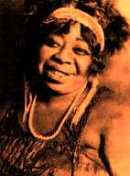
Painting © 2004 Loz
Arkle
Website
© Copyright 2000-2011 Alan White - All
Rights Reserved
Site optimised for Microsoft Internet Explorer



Some
Blues Roots of Rock 'n Roll Music |
|
Ever since the middle 1950’s when rock ‘n roll hit the sound waves, Western music, and particularly the U.K./U.S. scene, have been irrevocably altered. Many titles have passed into near legendary status, such as “Rock Around The Clock”, by Bill Haley, “Be-Bop-A-Lula” by Gene Vincent and “Blue Suede Shoes” by Elvis Presley. Not so well known, is the original of the latter song by rock-a-billy ace, Carl Perkins, yet it was still a considerable hit in the U.S.A. Another song reverses the situation insofar as Perkins did the “cover”, albeit nearly thirty years later! Perkin’s title was “Matchbox” and uses the lines;
Way back in 1927, on the l4th.March, boss Texas Bluesman, Blind Lemon Jefferson recorded the first version of his justly, famous “Match Box Blues” for Okeh in Chicago. About a month later he was to have two more versions issued on Paramount records. All three have the same verse in common:
Interestingly, Ma Rainey was from Columbus, Ga. and Jefferson travelled through the state, even recording in Atlanta for his Okeh sessions; indicating Georgia as a possible source? Oliver also allowed that as far as the matchbox image is concerned, Rainey and Jefferson “...may have absorbed it from traditional usage.”(4). Of course the term ‘rock ‘n roll’ itself came originally from black parlance in the first two decades of this century; and originally meant sexual intercourse. In much the same way that the widely used phrase, ‘in the groove’, which was considered ‘hip’ in the late 1950’s, actually started out as an allusion to the act of making love! The phrase is still used by the younger generation today in its corrupted form ‘groovy’. One of the most famous sexual blues lines was the title of a Tampa Red Hokum Jug Band number in 1929, “My Daddy Rocks Me (With One Steady Roll)”, with Frankie ‘Half-Pint’ Jaxon delivering a superb, raunchy imitation female vocal. Tampa’s beautiful bottleneck guitar and the band, moaning behind “her”. By the time Bill Haley and the Comets recorded “Shake, Rattle And Roll” in 1954, the meaning had shifted to refer to dancing, in a white ‘clean-up’ job of the original black version by erstwhile Kansas City blues shouter, Big Joe Turner, recorded earlier the same year. But the first appearance of the phrase on record, would seem to go back to 1931 in a blues by the then man-and-wife team of Kansas Joe McCoy and Memphis Minnie:
Once again, some lovely bottleneck/slide guitar, from Minnie this time, with Joe supplying a rock-steady rhythm. Around 1958, Elvis Presley recorded “Teddy Bear” for R.C.A. and included the words:
Meanwhile, back with Blind Lemon and “Match Box Blues”, take 2, on Paramount this time:
Around four years later, Peetie Wheatstraw’s buddy, based in St. Louis, Charlie Jordan, sang:
The twin rhythms of Charlie’s guitar and Peetie’s piano, sounding almost ‘rocky’ at times! Just goes to show you, there ain’t nuthin’ new under the sun! Notes l.
“Matchbox.” Carl Perkins. 1957. References 1.
Oliver Paul. “Screening The Blues.” Cassell, London. 1968. Copyright Ó Max Haymes, 1994. All Rights Reserved __________________________________________________________________________
Website © Copyright 2000-2011 Alan White. All Rights Reserved. |





 Almost three
years earlier, the great ‘classic blues’ singer Ma Rainey, had cut her
“Lost Wandering Blues” which included a variation of these lines. She could
of course got the verse from Jefferson, as Paul Oliver has pointed out, since
Blind Lemon was an itinerant rambler all over the southern states, at that time
(1924). It is significant that Rainey used a guitar and banjo, played by the
Pruitt twins, Miles and Milas, probably acknowledging the verse’s rural
origins. In any event, ”Lost Wandering Blues” marked Ma Rainey’s first
departure, on record, from the ‘standard’ classic Blues accompaniment of a
small jazz outfit, Jefferson’s verse (if it is his) obviously caught the
imagination of other blues singers. On 11th March, 1929, Georgia twelve-string
guitarist, Willie Baker opened his excellent “Weak-Minded Blues” with a
slight elaboration, which gave his words a tinge of bitter irony:
Almost three
years earlier, the great ‘classic blues’ singer Ma Rainey, had cut her
“Lost Wandering Blues” which included a variation of these lines. She could
of course got the verse from Jefferson, as Paul Oliver has pointed out, since
Blind Lemon was an itinerant rambler all over the southern states, at that time
(1924). It is significant that Rainey used a guitar and banjo, played by the
Pruitt twins, Miles and Milas, probably acknowledging the verse’s rural
origins. In any event, ”Lost Wandering Blues” marked Ma Rainey’s first
departure, on record, from the ‘standard’ classic Blues accompaniment of a
small jazz outfit, Jefferson’s verse (if it is his) obviously caught the
imagination of other blues singers. On 11th March, 1929, Georgia twelve-string
guitarist, Willie Baker opened his excellent “Weak-Minded Blues” with a
slight elaboration, which gave his words a tinge of bitter irony: